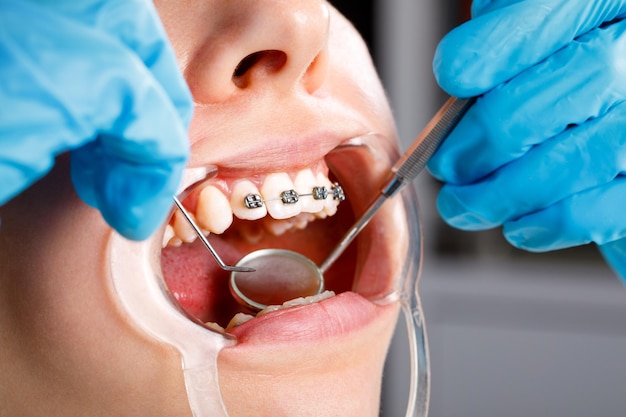Getting braces is a major step toward achieving a healthier, more aligned smile—but it can come with a few temporary side effects, including changes in speech. For those starting their journey with dental braces in Dubai, it's perfectly normal to notice minor differences in how you pronounce certain sounds. The good news is that these changes are usually short-lived, and with the right techniques, you can adapt quickly and speak clearly with confidence.
Why Braces Affect Speech:
Braces impact speech because they slightly alter the space inside your mouth and the way your tongue interacts with your teeth. When brackets and wires are first placed, your tongue needs time to adjust to the new surfaces. This can make it more challenging to produce sounds like “s,” “sh,” “th,” or “z,” which rely on precise tongue placement. These changes may cause a temporary lisp or muffled speech, especially during the initial days of treatment.
Common Speech Issues with Braces:
Most speech changes caused by braces are minor and temporary. However, it’s helpful to understand what to expect so you can prepare accordingly.
Typical speech effects include:
- Lisping: Especially with “s” or “z” sounds
- Slurred or muffled speech: Due to excess saliva or tongue adjustment
- Difficulty with certain consonants: Like “t,” “d,” or “th”
- Slower speech: As you become more conscious of articulation
These issues generally improve within one to two weeks as your mouth adjusts.
How Long It Takes to Adjust:
The adjustment period varies for each person, but most people begin to notice improvements in their speech within the first 7–10 days of getting braces. Some may adapt faster, especially if they practice speaking regularly. The type of braces you wear, your age, and your overall comfort level can influence how quickly you adjust. If you're wearing clear aligners instead of traditional metal braces, the impact on speech may be even less noticeable and shorter-lived.
Tips to Adapt Your Speech Quickly:
Practicing proper speech techniques can speed up the adaptation process. The more you use your voice and articulate words, the quicker your tongue and lips will learn to work around your braces.
Here’s what you can do:
- Read aloud daily: Choose books, news articles, or anything you enjoy
- Practice tongue twisters: Great for improving enunciation and control
- Speak slowly and clearly: This builds awareness and precision
- Record yourself: Listening to your own speech can highlight areas to improve
- Stay hydrated: A dry mouth can worsen speech clarity
Consistency is key—practice a little each day to strengthen muscle memory.
When to See a Speech Therapist:
In rare cases, if speech issues persist beyond a few weeks or significantly affect communication, it might be beneficial to consult a speech therapist. This is particularly helpful for individuals who had pre-existing speech conditions before getting braces. A professional can offer targeted exercises to improve articulation and ensure your orthodontic treatment doesn't interfere with verbal expression.
Children and Speech Development:
Parents often wonder how braces might affect a child’s speech, especially if they’re in the middle of language development. While it’s true that braces can cause a temporary speech adjustment, most children adapt quickly—often faster than adults. Encourage kids to read aloud, sing songs, or engage in regular conversations to help speed up the process. If concerns continue, your orthodontist may recommend a brief speech evaluation.
Braces-Friendly Habits That Help:
In addition to speech exercises, adopting a few braces-friendly habits can support overall comfort and help you speak more clearly.
Helpful habits include:
- Using orthodontic wax: This reduces irritation that can affect speech
- Maintaining good oral hygiene: A clean mouth reduces inflammation and discomfort
- Chewing sugar-free gum (if approved): Can help retrain the tongue and jaw
- Avoiding sticky or hard foods: These can cause pain or damage that interferes with speaking
These small changes make a big difference in how quickly you feel at ease speaking with braces.
How Retainers and Aligners Compare:
After braces are removed, you may be given a retainer—which can also temporarily affect your speech. Similarly, clear aligners like Invisalign may cause a mild lisp at first. However, because these appliances are removable, many users find them easier to adjust to. Whether you’re using traditional braces or removable aligners, the adaptation process follows the same principles: patience, practice, and persistence.
Confidence While Speaking with Braces:
Speech concerns can make some people feel self-conscious, especially in social or professional settings. It's important to remember that most people won’t notice minor speech changes as much as you think. Stay confident, maintain eye contact, and continue engaging in conversation. For those wearing dental braces in Dubai, support from orthodontists and a focus on regular speech practice can help you overcome any insecurities quickly.
Final Thoughts:
Braces may temporarily affect your speech, but with the right techniques and mindset, adaptation happens quickly and naturally. Whether you're dealing with a slight lisp or trouble with certain sounds, practice and patience go a long way. The key is to stay consistent, use helpful speech strategies, and trust that your mouth will adjust in time. For those who’ve chosen dental braces in Dubai, expert care and advanced orthodontic options mean fewer disruptions and a smoother adjustment process. Embrace the journey with confidence, knowing that clearer speech—and a perfect smile—are just around the corner.

